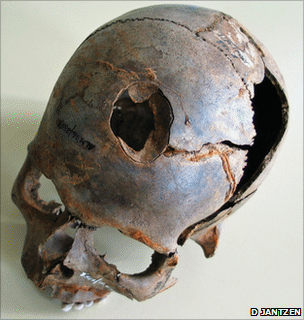Early Bronze Age battle site found on German river bank
Neil Bowdler
Source - http://www.bbc.co.uk/news/science-environment-13469861
Fractured human remains found on a German river bank could provide the first compelling evidence of a major Bronze Age battle.
Archaeological excavations of the Tollense Valley in northern Germany unearthed fractured skulls, wooden clubs and horse remains dating from around 1200 BC.
The injuries to the skulls suggest face-to-face combat in a battle perhaps fought between warring tribes, say the researchers.

One of the finds from the site included this human skull with a large fracture
The paper, published in the journal Antiquity, is based primarily on an investigation begun in 2008 of the Tollense Valley site, which involved both ground excavations and surveys of the riverbed by divers.
They found remains of around 100 human bodies, of which eight had lesions to their bones. Most of the bodies, but not all, appeared to be young men.
The injuries included skull damage caused by massive blows or arrowheads, and some of the injuries appear to have been fatal.
One humerus (upper arm) bone contained an arrow head embedded more than 22mm into the bone, while a thigh bone fracture suggests a fall from a horse (horse bones were also found at the site).
The archaeologists also found remains of two wooden clubs, one the shape of a baseball bat and made of ash, the second the shape of a croquet mallet and made of sloe wood.
Dr Harald Lubke of the Centre for Baltic and Scandinavian Archaeology in Germany said the evidence pointed to a major battle site, perhaps the earliest found to date.
"At the the beginning of the Neolithic, we have finds like Talheim in Germany, where we have evidence of violence, but it doesn't look like this situation in the Tollense Valley where we have many humans there in the riverbed," he told the BBC.
"We have a lot of violence from blunt weapons without any healing traces, and we have also evidence of sharp weapons. There are a lot of signs that this happened immediately before the victims died and the bodies are not buried in the normal way."

A croquet mallet-shaped club uncovered at the Tollense Valley site
The archaeologists found no pottery, ornaments or paved surfaces which might be suggestive of formal graves or burial rituals.
Many of the bones appear to have been transported some distance by the river, although some finds appear to be in their original position.
The researchers suggest the bodies may have been dumped in the river before being washed away and deposited on a sandbar. Alternatively, the dead could have been killed on the spot in "the swampy valley environment", the paper concludes.
Dr Lubke believes the real conflict may have been fought out further up the river, and that the bodies so far found represent just a fraction of the carnage wrought by the battle.
"This is only a sample, what we have found up until now - the modern river bed only cuts across part of the river bed of that time. There are likely to be many more remains.
"It's absolutely necessary to find the place were the bodies came into the water and that will explain if it really was a battle or something else, such as an offering, but we believe that a fight is the best explanation at the moment."
Evidence was also found among the human remains of a millet diet, which is not typical of Northern Germany at the time, which the researchers say may betray the presence of invaders.
While bronze pins of a Silesian design could suggest contact with the Silesian region 400km to the south-east, they say.